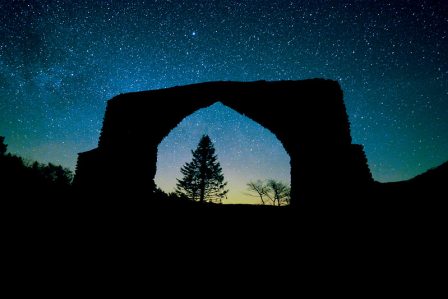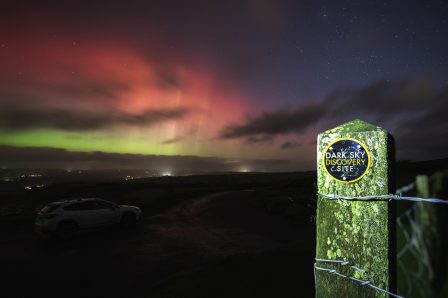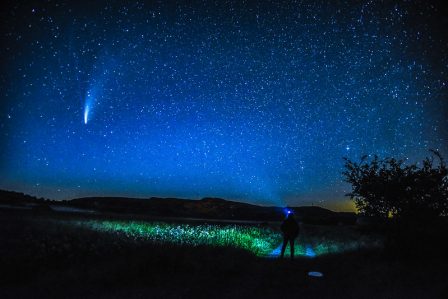Stargazing in Ceredigion
With the highest percentage of land protected by Dark Skies status in the world, Wales is amazing for stargazing.

Credit: Dafydd Wyn Morgan
2024 is also predicted to be the best year over the next two decades for seeing the Northern Lights from the UK. So now is the perfect time to come and stargaze here.
If you’re are looking for the night skies of your childhood, it’s unlikely that you’ll find them in much of the UK as light pollution has sprawled out from cities to cover much of our countryside. Luckily rural Wales is amazing for dark skies.
You can stargaze year-round here. Autum and Winter offer some great opportunities if you don’t want to stay up too late, but August sees one of the best and most well know meteor showers, The Perseids. Funnily enough they are known as The Perseids as the radiant is in the Perseus constellation! At its peak you can see up to 100 shooting stars an hour. The Geminids in December also offer an amazing rate of up to 150 shooting stars an hour at their peak.
Canvas & Campfires
Canvas & Campfires is right on the edge of a Dark Sky reserve, with 9 dark sky discovery sites nearby and an astro trail nearby. It takes about 40 mins (the most beautiful drive) to get to the Elan Valley which has 45,000 acres protected against light pollution. However if you don’t feel like leaving the farm, you can see the milky way from you deck or hot tub and when there is a new moon you can’t even see you hand in front of your face! At Canvas & Campfires we are a class 3 dark sky. 1 is the best and I don’t think we have anything at class 1 in the UK, Bardsey Island off the Llyn Peninsula is a class 2. London is a 9 and Cardiff is a 7 to give you some idea of the difference. You can check out your light pollution/dark sky status on this interactive map.
You can see the Milky Way from our glamping site and we have seen Comet Neowise and the Aurora Borealis without leaving the farm.

Credit Dayfdd Wyn Morgan
Whatever month you come the night sky is always amazing, but below we’ve put together a calendar just in case it helps you decide when to visit. And if you need more information on what accomodation we have you can find it here.
Stargazing Calendar 2024
January
-
Neowise comet
Credit: Dafydd Wyn Morgan28 Dec – 12 Jan – Quadrantids Meteor Shower
- 25 Jan – Full Moon (Wolf Moon)
February
- 24 Feb – Full Moon (Snow Moon)
March
- 10 Mar – New Moon
- 25 Mar – Full Moon (Worm Moon)
April
- 8 Apr – New Moon
- 14 – 30 Apr – Lyrids Meteor Shower
- 24 Apr – Full Moon (Pink Moon)
May
- 8 May – New Moon
- 19 Apr- 28 May – Eta Aquariids Meteor Shower
- 23 May – Full Moon (Flower Moon)
June
- 6 Jun – New Moon
- 22 Jun – Full Moon (Strawberry Moon)
July
- 3 Jul – 15 Aug – Alpha Capricornids Meteor Shower
- 5 Jul – New Moon
- 12 Jul – 23 Aug – Delta Aquariids Meteor Showers
- 21 Jul– Full Moon (Buck Moon)
August
- 4 Aug – New Moon
- 17 Jul – 24 Aug – Perseids Meteor Shower
- 19 Aug – Full Moon (Sturgeon Moon)
September
- 3 Sep – New Moon
- 18 Sep– Full Moon (Corn/Harvest Moon)
October
- 2 Oct – New Moon
- 6-10 Oct – Draconids Meteor Shower
- 2 Oct – 7 Nov – Orionids Meteor Shower
- 17 Oct – Full Moon (Hunter’s Moon)
November
- 1 Nov – New Moon
- 20 Oct – 10 Dec – Taurids Meteor Shower
- 6 Nov – 30 Nov – Leonids Meteor Shower
- 15 Nov – Full Moon (Beaver Moon)
December
- 1 Dec – New Moon
- 4 Dec – 20 Dec – Germinids Meteor Shower
- 15 Dec – Full Moon (Cold Moon)
Find out more about stargazing in Wales
















